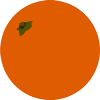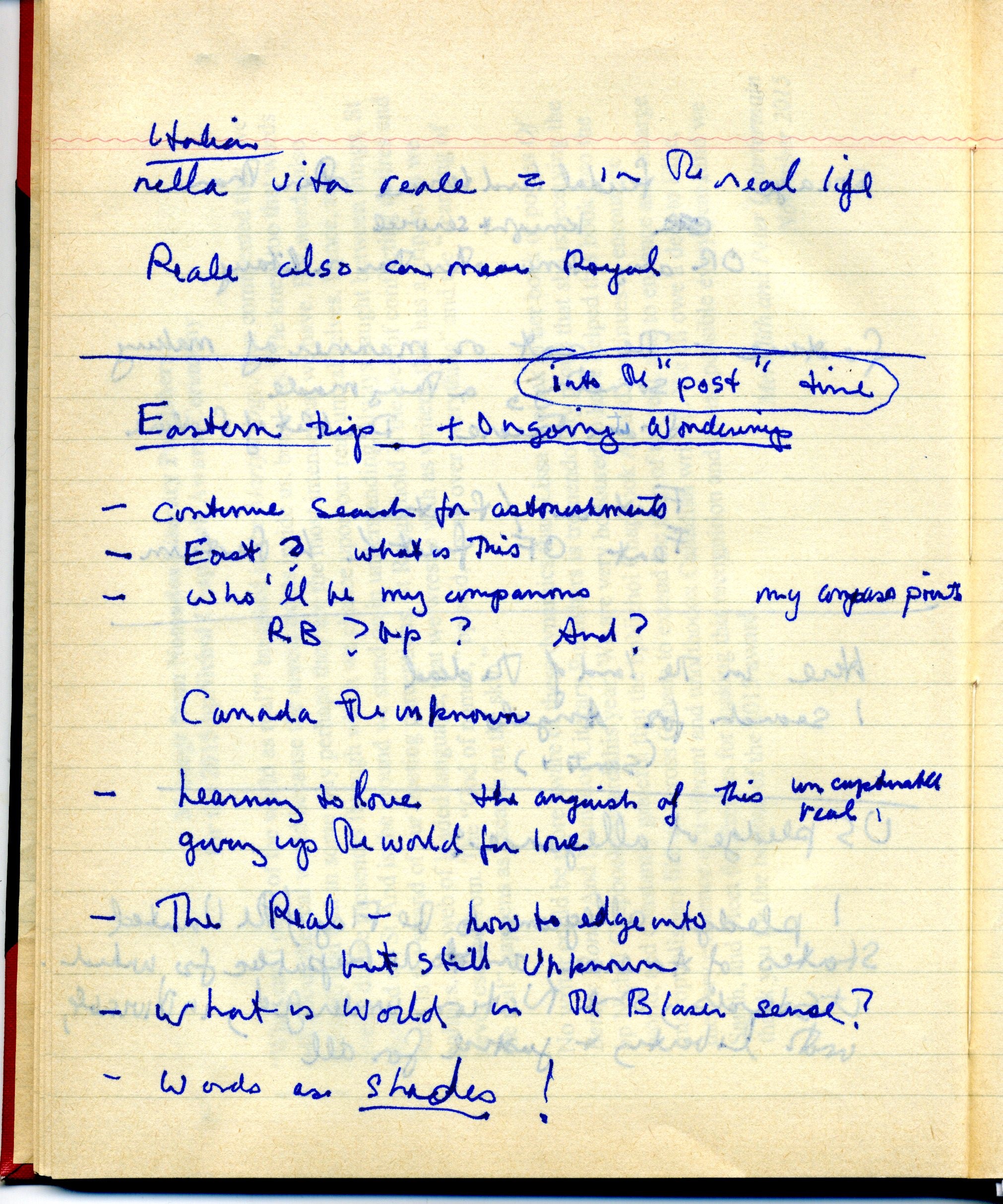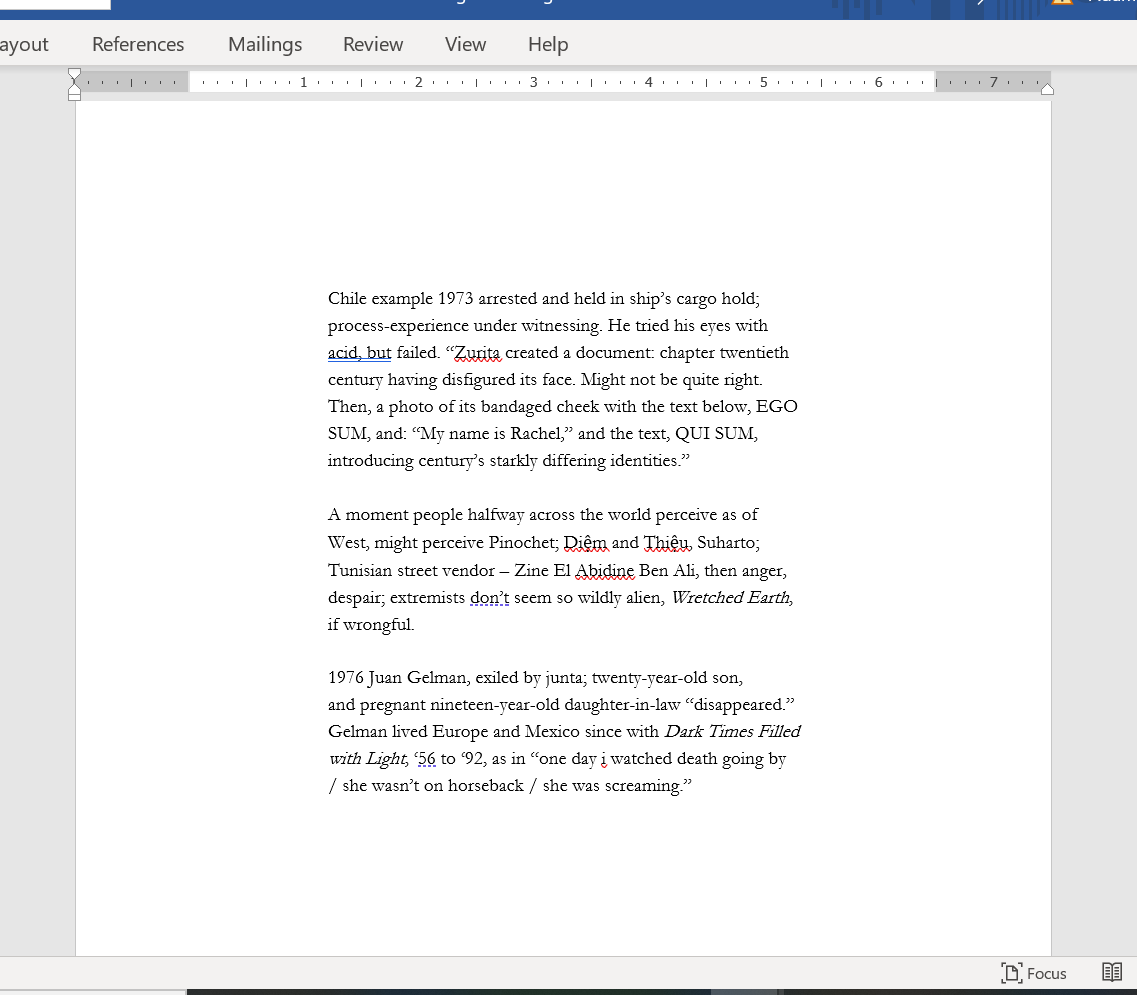Inter-
Meredith Quartermain
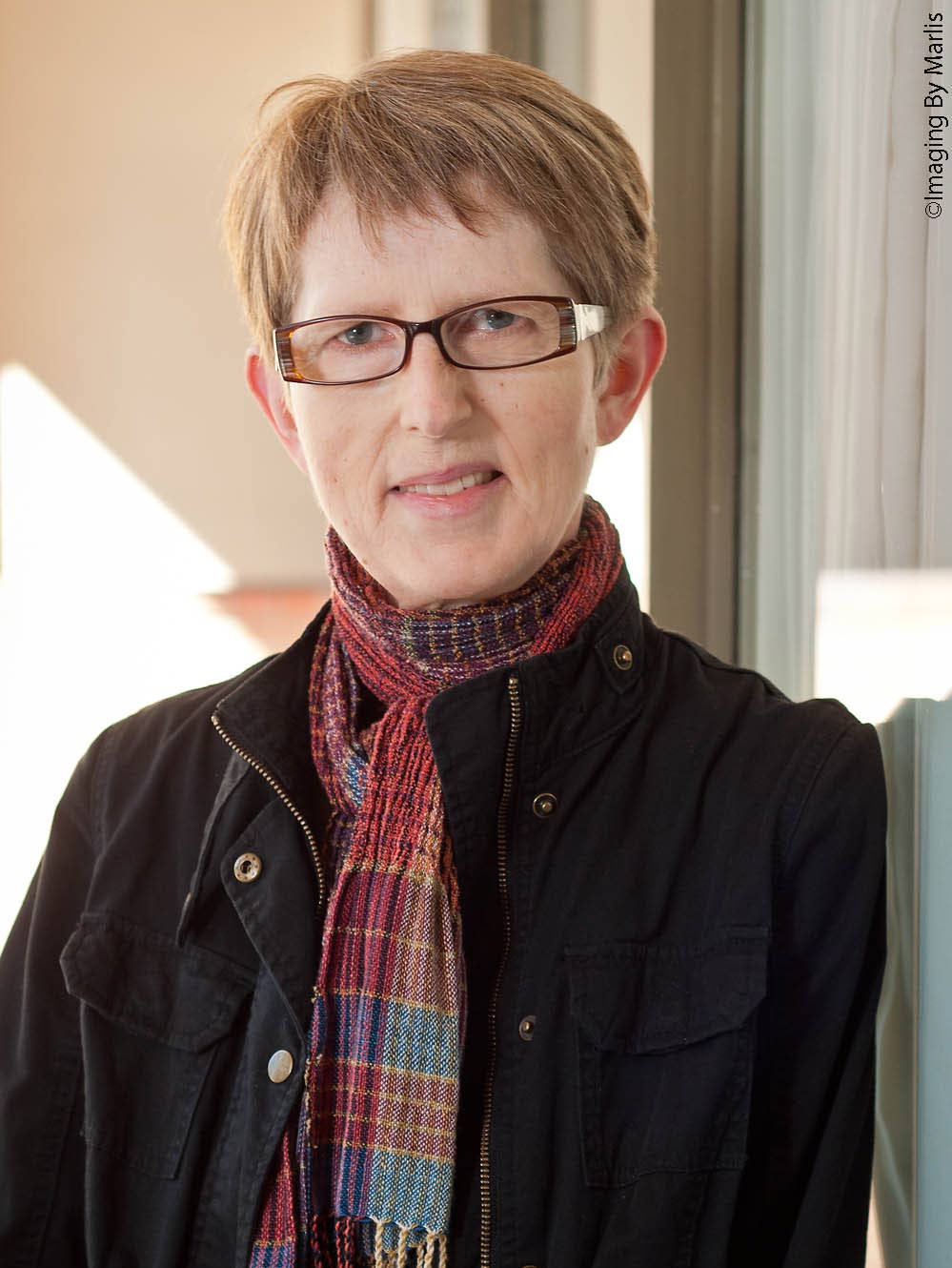
On Practice:
Do you write at the same time every day, in the same place? How would you describe your writing practice/s?
Up until recently, I wrote five days a week from about eight a.m. to one p.m. I stayed away from email and social media, or any kind of interference from the outside world, and gave creative work my best energy, before the demands of the day made it difficult to focus. Lately, I’ve had to abandon that strategy and make the best use I can of all the little snatches of time I can get. My practice amounts to a self-pep talk that goes “okay you’ve got 30 minutes; let’s see what you can do!”
What do you do if you get stuck while writing a poem?
Research history, geography, ecology, and language connected to the work in progress. Secondly, dialogue with self. Write out by hand open-ended questions like “what does this poem want?” “what do I need to know in order to continue?” It’s amazing what comes back.
Take a photograph of a page from your notebook or a screenshot of an electronic file of a poem you have been recently writing or revising.
Here’s a page from a notebook used for Lullabies in the Real World.
On Poetry:
Is there something you once believed about poetry that you no longer hold true? What changed?
I started writing in the decade of L=A=N=G=U=A=G=E poetry, and a lot of my earlier work involves densely patterned investigations of sound, syllable, rhythm, syntax, etc. Writers were expected to “critique” the language that they used. Which is sound advice; a poet should not take for granted that words will evoke for the audience the same associations they evoke in the poet. Lately, though, I’ve come to appreciate simpler language that connects the audience to the world of feeling.
What can/does poetry change?
I’m all for any art form including poetry that takes us away from the utilitarianism of market efficiencies. Step away from profit logics, and you can see what to change.
Is there something you now think you know about poetry that you wish you’d known a decade ago?
I’m very uncomfortable about “thinking I know” things. Certainty doesn’t usually help a poet.
On Influence & Inspiration:
What books are on your night stand, the back of the toilet, your desk?
Hannah Arendt, The Life of the Mind; Billy-Ray Belcourt, A History of My Brief Body; Robin Blaser, Never Let the World Go By.
Which writer/s do you (re)read the most? What does the writing do for you upon return?
I’m very fond of classics like Remembrance of Time Past, The Adventures of Don Quixote, Melville’s The Confidence-Man and Moby Dick. Dostoevsky’s Crime and Punishment: rich complex narratives and imagery. It’s not so much particular writers I return to as areas of thought. I enjoy books on ecology, geological history, social history, and philosophy; voices and consciousness from other realms that come into play in poems.
Among the poets you most admire, who has influenced you the least? Why have you not been influenced by his/her work?
I admire the writings of Gertrude Stein a great deal, and also the work of Emily Dickinson. Stein is endlessly playful and endlessly thoughtful. Her highly recognizable style is not something I want to adopt, however. Dickinson’s powerful condensed poems are masterpieces, but it’s a mistake to write in the manner of someone else.
Describe a moment from your life when you've been overcome by how beautiful something is.
Almost anything can transport me with the sheer joy of being alive: an autumn leaf on the sidewalk; a raindrop on the brim of my hat; crows on wet grass. One place will always stay with me: the top of Idaho Peak in the Kootenays where we scattered my mother’s ashes as she had wanted, in a meadow of lupins, pussytoes, paintbrush, and fireweed, overlooking far below the silver mirror of Slocan Lake tucked among the feet of the Valhalla range. We took handfuls from the urn; ash and bits of bone streamed through our fingers into the flowers and back onto us in the alpine breeze.
On Teaching:
How would you describe poetry to a four-year-old? To the non-literary family ancestor you imagine as a great source of who you are?
Alice Notley, whose poetry I thoroughly admire, once told me she thought her poetry was strongly connected to the sense of right and wrong she formed at the age of four. Ask a four-year-old, and I think most already know perfectly well what to do in a poem, so I think I’d be highly unlikely to attempt to describe poetry to one other than to say it’s a place where you can put words together in whatever way you want. And I’d say the same thing to my revered ancestor.
What characteristics does your ideal poem possess?
Explores patterns of sound, sense, and intellect; enters and invokes a field of possibilities, rather than laws or absolute claims; pays attention to rhythms; creates a palate for thought and feeling.
Do you teach poetry? If so, what are you trying to teach through poetry? What has poetry taught you?
I have taught poetry in workshops focused on things like politics and poetry, or the writing of place. I acted as Poetry Mentor in the Simon Fraser University Writer’s Studio for three years, leading poetry workshops with a small group over an extended time. I mainly try to help growing poets connect to their own energies and insights, by giving them experiments to try and then discussing what they discovered by doing these experiments. I think poetry has taught me that a good poet must listen very carefully.
On Publishing & Themes Present/Future:
How has publishing your poems changed your writing practice, process, and product?
Publishing has taught me how valuable editors are, how valuable feedback is, and how necessary it is to allow time for creative work to go through editorial feedback, and to then use that feedback to create an even better iteration of the work. To allow the work to stand on its own in the world, the poet must let it become something in dialogue with a world that the poet cannot fully grasp.
Is there a poem you've always wanted to write but haven’t? If so, why are you waiting? What subjects, themes, forms, aesthetics, etc. do/will you explore in your work?
I’m not sure what the next poetic adventure will be. There’s something about being called to write a thing, as I was with Lullabies in the Real World, which grew unexpectedly out of a travel journal. I’m mulling over now what to do with all my records of the ships coming in and out of our port, thinking there’s something to do here.
On Oranges:
Oranges or apples? Why?
“Oranges and lemons say the bells of St. Clement’s.”
About the Poet
Meredith Quartermain’s Lullabies in the Real World (NeWest Press, 2020) was shortlisted for the Alberta Book Publishers’ Robert Kroetsch Award for Poetry. Vancouver Walking (NeWest Press, 2005) won a BC Book Award for Poetry. Fiction titles: Recipes from the Red Planet (Book*hug Press, 2010), a finalist for a BC Book Award in fiction, and U Girl (Talonbooks, 2016).
Inter-
Adam Day
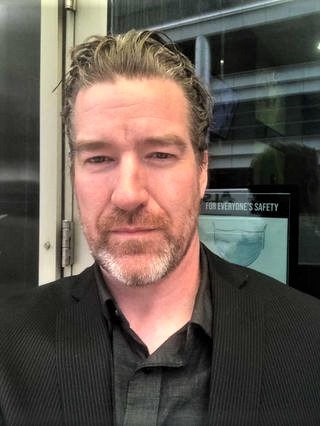
On Practice:
Do you write at the same time every day, in the same place? How would you describe your writing practice/s?
I don’t. I write in different places, at home and out in the world, and at different times.
I go through periods of writing a lot, sometimes on different projects, sometimes in different genres. And I go through periods of not writing much, at all; this usually happens when I’m not engaging with substantive film, writing, art, music, &c.
What do you do if you get stuck while writing a poem?
I just come back to it later.
Sometimes I’ll read, or watch a film to see if it catalyzes something.
Take a photograph of a page from your notebook or a screenshot of an electronic file of a poem you have been recently writing or revising.
On Poetry:
Is there something you once believed about poetry that you no longer hold true? What changed?
In my twenties I seemed to place a lot of value on linearity, narrative, and revelation/catharsis, though from my early teens until that point I had not done so. I don’t think those characteristics are necessarily without value, but they don’t hold a unique place for me in the way that I write, read, think, or see.
What can/does poetry change?
I’m not sure poetry changes much of anything in a practical sense. Though, I believe it can potentially lead the writer and others to be more empathetic, and allow for a perhaps previously undiscovered outlet for processing the complex and complicated world of senses and ideas.
Is there something you now think you know about poetry that you wish you’d known a decade ago?
That adjuncting for more than a couple years is completely ridiculous (unless you love it, and can afford it), and that it is a means for institutions to take advantage of educators.
On Influence & Inspiration:
What books are on your night stand, the back of the toilet, your desk?
The phenomenal collection of poetry by Miroslav Holub, Sagittal Section; The Book of Equanimity: Illuminating Classic Zen Koans; Kobo Abe’s novel, The Box Man; Catherine Wagner’s poetry collection, Of Course; Sky Above, Great Wind: The Life and Poetry of Zen Master Ryokan by Kazuaki Tanahashi; Jean Genet’s novel, The Thief’s Journal; Fred Moten’s poetry collection, The Little Edges; Harmony Holiday’s poetry collections, Hollywood Forever, and A Jazz Funeral for Uncle Tom; Doug Kearney’s poetry collection, Buck Studies; Shakespeare’s Twelfth Night, Virginia Woolf’s Orlando, several of Susan Sontag’s essay collections/monographs.
Which writer/s do you (re)read the most? What does the writing do for you upon return?
More than anything, I read modern and contemporary writing—primarily fiction—from abroad/in translation: Jakov Lind, László Krasznahorkai, Flann O’Brien, Bulgakov, Rabelais, Wei Ying-wu, Genet, Abe, Beckett, Arendt, Joyce, Maurice Merleau-Ponty, Georgi Gospodinov, Merce Rodoreda, Svetlana Alexievich, Bohumil Hrabal, Adorno, Camilo José Cela, Antoine Volodine, Keith Ridgway, Georgi Tenev, G.B. Edwards, Máirtín Ó Cadhain, Stoppard, Ionesco, Pinter, Synge, &c.
I also find important, the work of Fred Moten, Darcie Dennigan, John Ashbery, Diana Hamilton, Don Mee Choi, Laura Sims, Catherine Wagner, Harmony Holiday, Wei Ying-wu, George Oppen, Monica Youn, Phil Levine, Sabrina Orah Mark, Ikkyu, Danielle Pafunda, Wayne Miller & Kevin Prufer’s anthology, New European Poets.
Among the poets you most admire, who has influenced you the least? Why have you not been influenced by his/her work?
Probably Dylan Thomas. Thomas’s voice, tone, mannerisms, particular images and style are inimitable.
Describe a moment from your life when you've been overcome by how beautiful something is.
My son’s birth.
Every time I walk across the Brooklyn Bridge, or transition from the George Washington Bridge to the Henry Hudson Parkway.
Standing on a mountain in New Zealand overlooking Auckland and the sea.
On Teaching:
How would you describe poetry to a four-year-old? To the non-literary family ancestor you imagine as a great source of who you are?
Words mimicking the movement of the mind.
What characteristics does your ideal poem possess?
The kind of complexity that does not give the poem away entirely, but also doesn’t exclude the writer, thus inviting the reader to return again and again to the poem for its nuance and idiosyncratic manner of being.
A poem that feels as though it is saying and or doing something new, and where there is something at stake.
A poem that is not precious or saccharine, and that avoids sentimentality.
Do you teach poetry? If so, what are you trying to teach through poetry? What has poetry taught you?
Not often. When I do, I’m trying to expose students to exercises that invite them to write in ways they are not used to, and to expose them to writing by others that is not what they normally read.
Poetry has taught me more, I imagine, than I can summarize. Patience, for one thing.
On Publishing & Themes Present/Future:
How has publishing your poems changed your writing practice, process, and product?
I don’t think it has.
Is there a poem you've always wanted to write but haven’t? If so, why are you waiting? What subjects, themes, forms, aesthetics, etc. do/will you explore in your work?
I tend toward the imagistic and the visceral.
Right now, I can’t think of a poem I’ve wanted to write, but haven’t.
On Oranges:
Oranges or apples? Why?
Oranges. Vibrancy.
About the Poet
Adam Day is the author of Left-Handed Wolf (LSU Press, 2020), and of Model of a City in Civil War (Sarabande Books, 2015), and the recipient of a 2010 Poetry Society of America Chapbook Fellowship for the chapbook Badger, Apocrypha (Poetry Society of America, 2011), and of a 2011 PEN Award. He publishes the magazine of arts and culture, Action, Spectacle.
